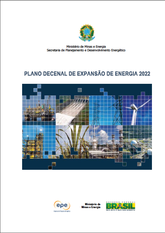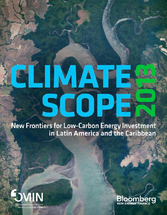

|
|
 The Brazilian government has released the latest Ten Year Energy Expansion Plan (PDE 2022) for public consultation. Comments are due by November 10 (send to [email protected]).
 The countries of Latin America and the Caribbean (LAC) are attracting more clean energy investment as governments strengthen policy support and local supply chains expand, according to Climatescope 2013, a new report from the Multilateral Investment Fund (MIF) and Bloomberg New Energy Finance (BNEF). The LAC region captured 6% of the total $268.7 billion invested worldwide in clean energy in 2012, up from 5.7% in 2011. (For purposes of the Climatescope analysis, clean energy is defined as wind, solar, biomass, small hydro, geothermal and other renewable power generation, and biofuels.) “The rapidly falling costs of clean technologies such as solar and wind power combined with an improved investment climate means that clean energy generation in the region is now truly affordable,” said Nancy Lee, General Manager of the MIF. The Global Cleantech 100 List is a list of the top 100 private companies in clean technology. Collated by combining proprietary Cleantech Group research data, with over 9,000 nominations and specific input from an expert panel, these companies represent the most innovative and promising ideas in cleantech—the companies that are most likely to make the most significant market impact over the next 5-10 years.
A total of 18 countries are represented on this year’s list year (a record), with the first entrant from Latin America. 61% of the companies on the list came from the North America region (with 56 companies from the United States). 32 of the companies are from the Europe & Israel region, six from Asia Pacific and, for the first time, a company from South America. Pure Biofuels de Perú specialises in liquid fuels storage, distribution, marketing, and biodiesel production in Peru. The concept of cleantech embraces a diverse range of products, services, and processes across industry verticals that are inherently designed to (a) Provide superior performance at lower costs, (b) Greatly reduce or eliminate negative ecological impact, and (c) Improve the productive and responsible use of natural resources.  Chilean Energy Minister Jorge Bunster and Indian Minister of New and Renewable Energy Farooq Abdullah met in Santiago, Chile in September to explore greater collaboration between the two countries in renewable energy development. Abdullah offered India’s support and expertise to Chile in setting up renewable projects as well as in capacity building and project preparation through the services of Indian experts and institutions like Centre for Wind Energy, Solar Energy Centre, and Alternate Hydro Energy Centre, according to a statement by the Indian government. The minister also offered training slots in India to Chilean scientists, engineers and technicians through the Indian Technical and Economic Cooperation (ITEC) Programm, and expressed his country’s desire for a serious and meaningful cooperation with Chile and the entire Latin American region. Chile is almost entirely dependent on imports for meeting its energy requirements and is looking to diversify by introducing a large component of renewable energy in its energy mix. Bunster noted the Chilean government’s interest in setting up a 50 megawatt solar thermal generating capacity in the north of the country, according to the statement.  REN21’s Renewables 2013 Global Status Report provides a comprehensive overview of renewable energy market, industry, investment and policy development worldwide. In a free webinar on October 7, REN21 experts will discus the status of renewables in South America. Click here to register. Full report is available here. Globally, 2012 saw:
|
Categories
All
Archives
January 2025
Blogroll
|
|
© 2013 - 2025 InterAmerican Clean Energy Institute, a project of Earth Ways Foundation Inc, a 501(c)3 nonprofit organization.
|
Web Hosting by iPage
|

 RSS Feed
RSS Feed